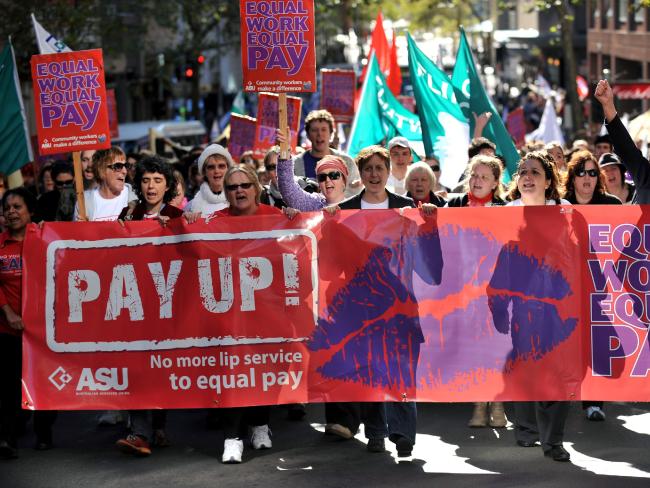WCP: Working-Class Women Unionists on the Front Lines
Posted in Visiting Scholars | Tagged Australia, Equal Pay, Feminism, John Russo, Sally McNamus, Sarah Attfield, Sherry Linkon, WCP, Women, Working-Class Perspectives
Working-class women are becoming the face of the labor movement in Australia and inspiring unions to fight for feminist issues. In this week’s Working-Class Perspective, Sarah Attfield profiles three women unionists at the helm of the worker struggle in Australia.
“One of the best examples of the power of women’s leadership is Sally McManus, the secretary of the Australian Council of Trade Unions, the umbrella body for unions in Australia. McManus is relatively new in the job, but she has breathed new life into the union movement. This is not an easy task. Trade union membership in Australia has been on the decline for several decades, and government attacks have diminished the power of unions to strike. Going on strike in Australia is a complicated process, with individual workers and unions engaging in unprotected industrial action facing very heavy fines. Media representations of unions have generally been negative, often focusing on some corrupt individuals and descriptions of union delegates on worksites as ‘thugs’. A Royal Commission set up to investigate unions was intended to further reduce public support, but it did not reveal widespread corruption in the labor movement.
In one of her first interviews as head of the ACTU, McManus argued that the rules relating to unions need to change and unjust laws should be broken. She has since headed a campaign to ‘change the rules’ which is being endorsed by many unions. Her influence shows the power of working-class women as organisers and agitators, in Australia and around the world.
McManus is an inspiring speaker. Her directness and emphasis on collective action reflects her working-class background and provides an antidote to the individualist nature of neoliberalism. She demonstrates the benefits of having working-class women in leadership positions.
McManus is the public face of the union movement at the moment in Australia, but she is not alone. For example, the New South Wales President of the Construction, Forestry, Mining and Energy Union (CFMEU), Rita Mallia, speaks on behalf of workers in the construction industry. Like McManus, Mallia spoke at the ‘Stop the War on Workers’ Rally, and she roused many cheers from the mainly male working-class membership of her union. Mallia has a law degree, but her working-class immigrant background shapes her understanding of blue-collar work and the lives of her members.
Michelle Parkin, a rank and file member of the Australian Manufacturing Workers Union, spoke at the rally, too, talking about a recent campaign at her worksite. A machine operator at an ice-cream factory, Parkin was one of 140 workers facing reductions in pay and conditions when their employer (a large multi-national) applied to have their enterprise agreement terminated. The union fought back, and with the help of the ACTU mounted a successful boycott campaign of the company’s popular products, following the model of another recent campaign against a brewing company. At the rally, Parkin presented the perspective of a female factory worker – challenging the image of the blue-collar workforce as male.
As women move into leadership, they are also expanding the scope of union concerns. For example, women have pushed for unions’ campaigns to include domestic violence leave into workplace agreements and drawn attention to issues like the gender pay gap and sexual harassment at work. These women workers often describe themselves as feminists, which normalises the term among working-class industries and communities.
Working-class women’s involvement in the Australian union movement is not new, but their visibility as the public faces of labor is. In the past, most union officials have been male, but now working-class women are demonstrating their strength, determination, and skills. The union movement has a much better future with more working-class women at the helm.”
Read the entire post and other Working-Class Perspectives posts on our website.

